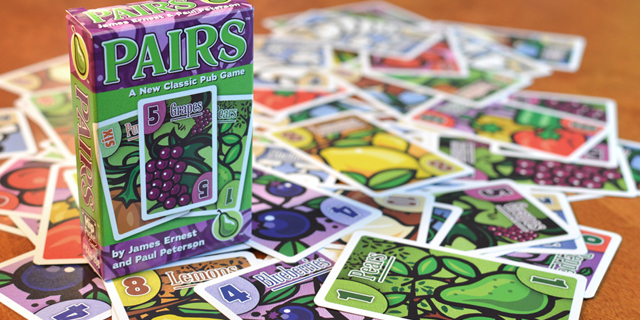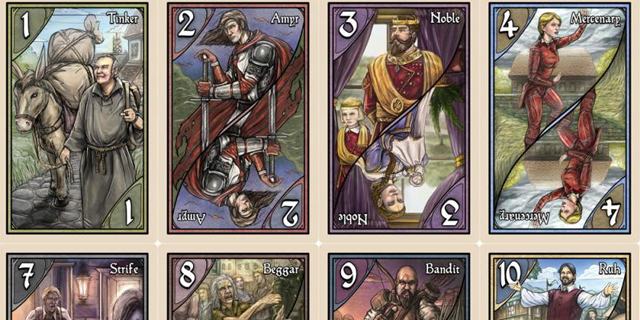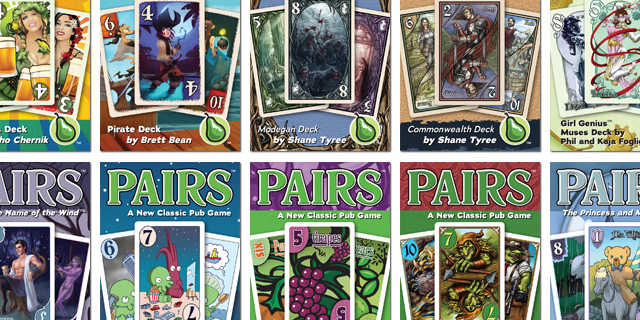
Pairs is what co-designer James Ernest calls a “new classic pub game.” It’s a dirt-simple game that can be played anywhere at any time, and requires nothing more than a single deck of specialized cards and a knowledge of the very basic rules. And yet it is so much more; more than anything else, Pairs is an illustration of how many different ways a simple design can be used by creative minds.
In its most basic incarnation, Pairs is a push-your-luck game in which the object is to avoid being dealt a pair. Normally this wouldn’t be much of a problem, but a Pairs deck isn’t a standard poker deck. Instead, it is a “triangular” deck, with one 1, two 2s, three 3s and so on up to ten 10s. On your turn you can either take a hit or fold. If you take a hit and are dealt a card that matches one you already have, you lose the round and score points equal to the value of the paired card. If you fold, you score points equal to the lowest card currently on the table. The game ends when one player has accumulated a set number of points and thus loses, usually after about 15 minutes — or fewer.

Even within that simple premise there are a few potential variants. In Continuous Pairs, instead of everything being discarded whenever a player scores, optionally only that player’s cards are discarded and everyone else keeps theirs. Additionally a player who folds has the option of taking any card on the table instead of automatically taking the lowest. This has strategic implications when it comes to what other cards are available for anyone who folds after you. Other variants assign additional properties to high-quantity cards like 7s or 8s, or allow you to “lock” your hand instead of folding in a quest to have the most cards in front of you when everyone else is locked or eliminated.
Of course, those are just the simple variants of the basic game. Some games have all cards face-up, and others give each player their own private hand. Some involve gambling (or at least paying tokens into a pot), and others are simply for fun. Almost all of the variants revolve around avoiding collecting a pair in one way or another, but a few take the deck in a different direction, using cards to bid for the acquisition of others (although pairs are often still a feature of the rules in some form). Some variants even have variants of their own!
Because the Pairs deck is so basic, it doesn’t really matter what (if anything) is illustrated on them. But thanks to the Kickstarter campaign completely obliterating its modest $12,000 target (it eventually amassed more than $300,000!), ten different decks were ultimately made, each with its own unique artistic theme. Artists Brett Bean, Echo Chernik, Pete Venters, Phil Foglio, Cheyenne Wright, John Kovalic, Nate Taylor and Shane Tyree each contributed ten amazing illustrations per deck (Taylor and Tyree illustrated multiple decks), giving each deck its own identity. And here is where the variants set in, as each individual deck comes packaged with the core Pairs rules and whichever variant(s) is most closely themed to that deck.

If you want to see all of the available variants without buying a dozen essentially identical decks, you can download the Pairs Companion for free from the Cheapass Games site. You might even be inspired to make one of your own! With Pairs, James Ernest and Paul Peterson have provided a gaming tool that might one day become as ubiquitous as the classic poker deck. This isn’t the first time I’ve experienced a triangular deck (that would be The Great Dalmuti in 1995), but it is the first time I’ve seen one used for more than one specific game, and that makes all the difference.
Pairs won’t be winning any year-end awards. In terms of strategic value, it’s barely even a filler. It supports up to eight players (depending on specific variant) effortlessly, although the basic game gets incredibly cutthroat at numbers over five due to the low threshold of points required to lose. When it only takes eleven points to end the game, catching a single pair of 8 or more almost takes you out immediately. But it is a lot of fun, and has enough variety to ensure that you never actually play the same game twice for some time. Sometimes, that’s all a game needs to do.
An individual Pairs deck retails for $10.



















